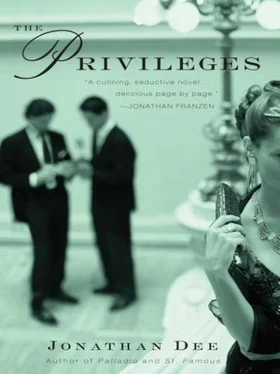“In a few days,” he said soothingly, “we’ll all be sitting on the beach, and we’ll have a new perspective on everything. Them too.”
They were whispering because though the kids had been put to bed down the hall hours ago, you never knew.
“Not so much,” Cynthia said. “I called the resort tonight and canceled our reservation.”
He struggled up onto his elbows and stared at her.
“The plane tickets weren’t refundable. Sorry about that. But I told the kids and they’re fine with it. We’ll have Christmas at home for once. It won’t kill us. I just don’t feel like being in a strange place right now.”
She started crying.
“But something has to change around here,” she said. “Something has to start getting better. You can’t just do nothing.”
“It will. Things are going great.” It was true, and yet even as he said it he could feel himself starting to panic. “Bonuses are this week, you know. It’s only going to get better for us.”
“I know it. But time doesn’t mean the same thing to you and me anymore, you know? You’re all like, in ten years we’ll have everything we want, and in the meantime I feel like I need binoculars just to be able to see to the end of the fucking day.”
“Look,” he said pleadingly, “I don’t blame you for being upset about what happened, but isn’t there another way of looking at it? I mean, April and Jonas knew what to do. They did exactly the right thing. In a way it should make you worry less. Plus, I don’t want to make light of it or anything, but it’s New York. You can’t protect them from everything.”
“Well, maybe we shouldn’t live here, then,” she said.
“What the hell are you talking about?”
“Maybe we should live somewhere else. Maybe we should be living a different kind of life. Who says it has to be this way? You think this is the best life we could be living? There’s so little space here. There’s so little room to move. It should feel safe but it just feels exposed. There’s got to be somewhere else for us to go.”
He was nervous about touching her all of a sudden. “I thought you said you wanted to stay here, though,” he said tentatively.
She shook her head, wiping her eyes. “Don’t you get it?” she said. “This is the only thing there is for me to be good at. And I suck at it. In fact I’m terrified I’m getting worse at it instead of better.”
“Cyn, it was one bad hour out of their lives. You seriously think, as good as our lives are, that that’s what they’re going to remember?”
“Don’t be an idiot,” she said. “You think you’re born knowing how to forget shit like that?”
Each December Sanford took them out to lunch one by one and gave them their bonus checks, along with a kind of performance review, known among the staff as the State of the Career Address, that helped explain the amount. The business itself was his whim, and while they all knew that it had been a profitable year, there was no expectation that the relative size of the bonuses reflected anything more precise than Sanford’s own fondness for them.
They were good enough friends to joke about their fear. The whole operation was so mercurial that it wouldn’t have been outside the realm of possibility for one of them to be fired at his or her bonus lunch, or for all of them to be handed a severance check and told that Sanford had decided to shut the place down. Adam, whose lunch was scheduled for the Friday before Christmas, was on a roll. He’d put together the first round of financing for a generic-drug start-up that was poised to get huge in a way few people other than Adam had foreseen; and he’d set up a friendly takeover of Wisconsin Cryogenics, friendly enough to keep the volatile Guy from Milwaukee in teenagers and blow for the rest of his life. The hardest part about putting that together was getting Guy to keep his mouth shut about it, so the stock wouldn’t overreact and screw the deal.
Sanford took Adam to Bouley, where they split two bottles of wine before the boss produced a check in a glassine envelope. “Open it,” he said immodestly, as if there were a ring inside.
Adam opened it and saw it was for three hundred and fifty thousand dollars. It was much more than he was expecting, or had received in previous years, and he’d heard enough to know that none of his colleagues had gotten anything close to it.
“This is between you and me,” Sanford said unnecessarily. In his old age he cried more easily. “This is not about the past year. This is about the future. I need to make sure you aren’t going anywhere. I need to be sure you know how you’re valued. I’m getting to the point where I need to think about the legacy that I leave in this world.”
Like a lot of his peers, Sanford maintained his social profile through lavish entertainments tied to charities; it wasn’t long after bonus season, when presumably they were all feeling flush, that his employees were dunned to buy tickets to that spring’s annual benefit for an organization close to his heart, the Boys and Girls Clubs of New York, to be held on the deck of the Intrepid , the decommissioned aircraft carrier that served as a floating naval museum at one of the Hudson River piers. A thousand dollars a head. For those who worked at Perini it was not an invitation there was any question of refusing. Adam bought a ticket for Cynthia as well. Normally he wouldn’t have forced her hand like that, but he needed to see a little of the old Cynthia, radiant at a party, for her sake but also for his own. She was so down these days, and though for the life of him he couldn’t see what there was to be down about, he was so used to being grounded by her that he had a real fear that, wherever she was drifting, he’d end up drifting right out there along with her. He couldn’t figure out what to try other than maybe to reenact an evening when she was happier.
It wasn’t much of a plan, but for that night, at least, it seemed to work. Cynthia was beaming as she shivered in a black dress in the hangarlike space below the deck of the ship, drinking some kind of themed martini, the center of attention among Adam’s colleagues from Perini, none of whom had sprung for the extra grand for a date. They took turns asking her to dance. He could see how smitten they were with her, with the idea of her, proof of life after marriage. Even when they got a little drunk and their gaze became a little more direct, it did not occur to him to feel jealous, because she deserved their attention. They ate rack of lamb. They saw Tiki Barber. Sanford and his wife came magnanimously by their table, everyone happily drunk.
“One of these things is not like the other,” Sanford said, smiling rakishly at Cynthia. “What are you doing at this table full of empty tuxedos?” He held out his hand to her, and when she held out hers, he kissed it. Victoria smiled into the middle distance.
“So nice to see you again, Barry,” Cynthia said.
“Please. The pleasure is all mine. You are the absolute jewel of this sorry gathering. Let me ask you something. Do you dance?”
“Not really.”
“Splendid. Son,” he said to Adam, “you don’t mind if I make off with your wife for a while, do you? Adam may not have told you this but I am a dance instructor par excellence. Among my many talents.” He held out his elbow; Cynthia, with a mock-frightened glance at her husband, put down her martini and glided off on Sanford’s arm toward the dance floor. Victoria saw a friend a few tables away, or pretended to, and she waved and chirped and left the table without a word.
“Unbelievable,” Parker said, not without a little envy in his voice. “Fucking old goat. And with his wife right there too. Amazing what that guy gets away with.”
Читать дальше












